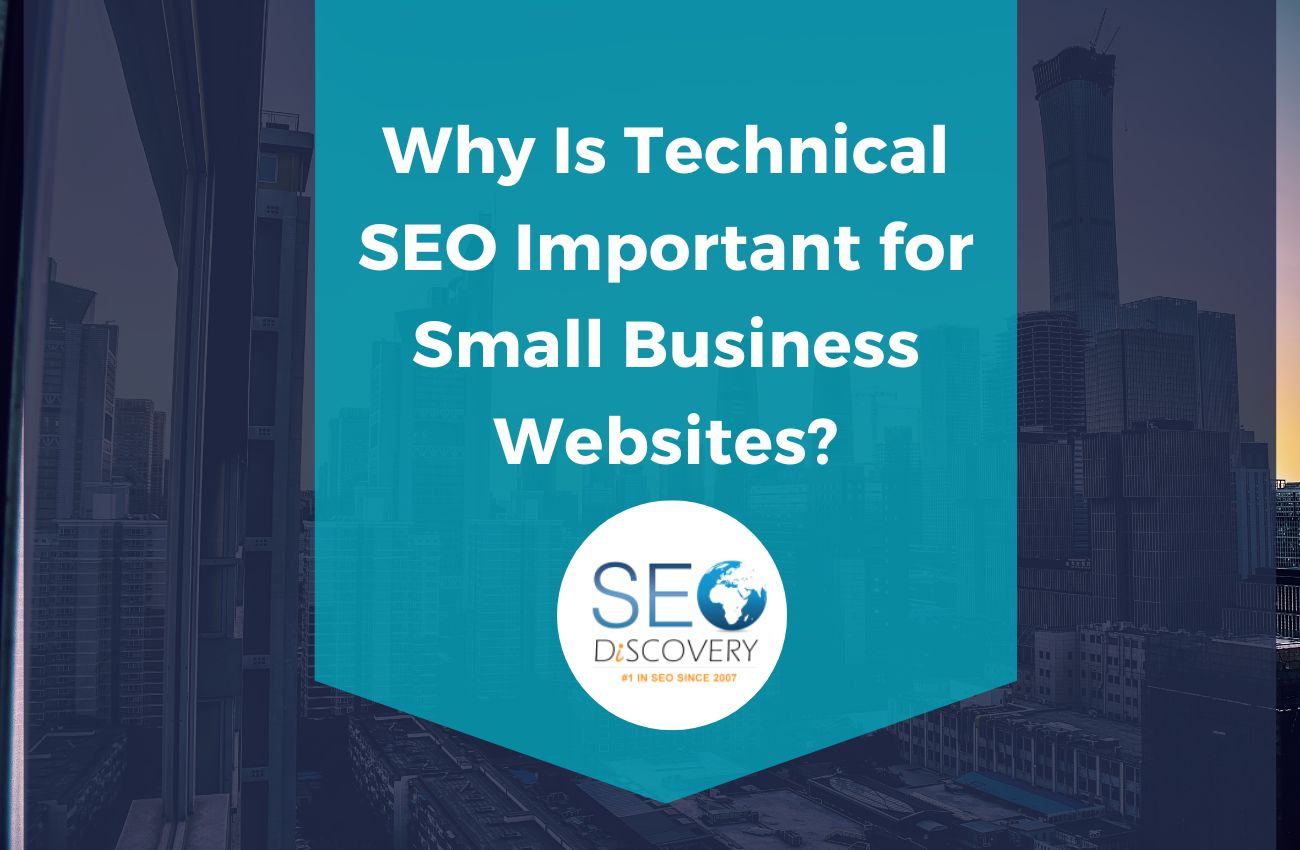In today’s digital age, it is more important than ever for small businesses to have a strong online presence. They can achieve this by doing search engine optimization on their website.
SEO is a method of enhancing the online visibility and ranking of a website in search engine results pages.
Basically, there are three types of SEO, such as On-Page, Off-Page, and Technical SEO.
On-page SEO is all about optimizing your own website’s content and code. For example, you can use relevant keywords, create compelling content, optimize images, and more.
On the other hand, off-page SEO is all about what you can do to make your website more visible, authoritative, and reputable online beyond just your own domain. You can do this by building quality backlinks from other reputable and relevant websites.
And lastly, technical SEO is all about improving the technical aspect of your website. For example, your website should load faster, the design must be mobile-friendly, and more.
Small businesses often overlook Technical SEO. But it is just as important as on-page SEO. In fact, technical SEO can have a significant impact on a website’s ranking in SERPs.
Go through this detailed blog to know the importance of technical SEO on small business and the practices involved in it.
What is Technical SEO?
Technical SEO is the process of optimizing the technical aspects of a website in order to improve its ranking in search engine results pages.
While traditional SEO concentrates on the keywords and content of a website, Technical SEO addresses the underlying factors that make your website crawlable, indexable, and user-friendly.
It is a combination of approaches and techniques designed to ensure that search engines are able to easily access, understand, and rank website’s content.
Advantages of Technical SEO on Small Business Websites
- Higher Search Rankings
It’s no secret that the online market is full of competition, and it can be hard for small businesses to stand out from the crowd.
But those small businesses that focus on technical SEO can outshine competitors that don’t.
In general, technical SEO is a key part of improving your website’s search engine visibility. Google and other search engines prioritize websites that give their users a smooth user experience.
Technical SEO helps make sure your website is easy to navigate, which means it’s more likely to get indexed and rank higher on search engines.
- Increased Website Traffic
The moment your website ranks higher in search engine results pages, it will tend to generate more organic traffic, which can result in increased leads and sales to your small business.
- Effective Indexing and Crawling
Web crawlers are responsible for navigating and indexing websites. If a website’s technical issues prevent it from crawling, your users could miss out on valuable content.
But, technical SEO helps optimize a website for search engines. It involves creating a website that is well-structured with friendly URLs and sitemaps.
Further, it includes proper internal linking, which helps search engine bots crawl and index a website more efficiently, increasing the likelihood of finding and ranking all relevant content.
- Improved User Experience
Technical SEO improves your website’s user experience. This means users are more likely to visit your site and make a purchase, contact you or do that thing whatever call-to-action buttons you have implemented on your website.
- Reduced Bounce Rates
A bounce rate is the percentage of visitors who leave your website shortly after visiting. A high bounce rate can be a sign to search engines that your website’s content isn’t relevant or that your user experience isn’t great.
Technical SEO can help you address some of the most common causes of high bounce rates. Some of them are –
- Slow loading speeds
- Mobile incompatibility
These are just a few of the factors that can lead to high bounce rates. By making sure your site’s user experience is as smooth as possible, you’ll be able to keep visitors engaged and influence them to keep coming back.
- Increased Security
It’s important to make sure your website is secure, not only for your users but also for search engines.
If a website isn’t secure or has an HTTP tag, it can be marked as unsafe, which can affect user trust and your search rankings.
When it comes to technical SEO, HTTPS is the way to go. It encrypts data between your browser and the server. So, not only does it keep your data safe, but it also sends a good signal to search engines that directly affect your search rankings positively.
Best Technical SEO Practices
If you own a small business, you need to optimize your website for technical search engine optimization. There are several steps you can take to enhance your technical SEO.
Before explaining those, we would like you to know that if you want to conduct a technical SEO audit for your business website to know what strategies you need to fix to improve your site’s technical SEO, you can use Screaming Frog SEO Spider. This technical SEO audit tool has a free version as well, which will be the best for your small business to get started with technical SEO.
- Faster Website Load Speed
In today’s fast-paced world, users are increasingly getting impatient with websites that take too long to load.
Even a few seconds of delay can result in a higher bounce rate and a decrease in user engagement. As a result, technical SEO focuses on optimizing various elements such as image size, server response time, and code performance to ensure a website loads faster.
Use the Google PageSpeed Insights tool to assess the speed of a website and identify areas for improvement.
- Optimize Website for Mobile Devices
Now that mobile devices are more popular than ever, having a mobile-friendly website is no longer an option but is a must. In fact, mobile-friendliness is one of Google’s most important ranking factors.
When it comes to technical SEO, responsive design is one of the most important things you can do to optimize your website for mobile devices.
Responsive design means that your website can adapt to different screen sizes and devices, making it easier for your small business to reach a wider audience and improve your search engine rankings.
- XML Sitemap
Create an XML sitemap to make it easier for search engines to figure out your website structure and index it better.
- Robots.txt File
A robot.txt file can be used to indicate search engines which areas of the website should be crawled and which areas should be avoided.
Generally, if you don’t want Google to crawl a few specific links or pages, you can implement this feature on your website. Otherwise, it doesn’t have any benefit.
- HTTPS and SSL
Use HTTPS to protect your site from unwanted spam and malware. It also ensures a secure browsing experience for your users when you install an SSL certificate on your website. Google prioritizes HTTPS over HTTP and considers it a ranking factor.
- Structured Data Markup
If you want your content to show up in search results with rich snippets, you need to make sure your data is structured. To do this, you’ll need to use schema.org markup, which will give search engines more information about your content.
Conclusion
If you are serious about enhancing your website’s ranking in search engine results, technical SEO is an essential element. By optimizing your website for this purpose, you can gain a competitive edge.
However, if you are unsure of where to begin your technical SEO journey, you can hire an SEO company. They will take care of all the technical SEO processes for you so that you can only focus on your small business operations.
FAQ
Technical SEO involves optimizing the technical aspects of a website to improve its search engine ranking and user-friendliness. It is crucial for small businesses as it enhances online visibility and helps them stand out in a competitive digital landscape.
Technical SEO focuses on the technical factors that make a website crawlable, indexable, and user-friendly, whereas traditional SEO concentrates on keywords and content optimization.
Technical SEO can lead to higher search rankings, increased website traffic, effective indexing, improved user experience, reduced bounce rates, and enhanced security for your website.
Yes, small businesses that prioritize Technical SEO can outperform competitors by offering a smoother user experience, leading to better search engine rankings.
Small businesses should focus on optimizing website load speed, ensuring mobile-friendliness, creating XML sitemaps, using HTTPS and SSL, and implementing structured data markup for rich search results.
When it comes to Amazon paid marketing, you can count on a top agency to provide you with regular and clear reports as well as transparent communication. They’ll usually give you detailed performance reports that show you all the metrics you need to know, including insights and campaign results.
They will communicate with you through regular meetings once a week or a month, depending on the agency. Here, you can discuss strategies, performance, and any changes you need to make to your Amazon advertising campaigns.



Add a Comment